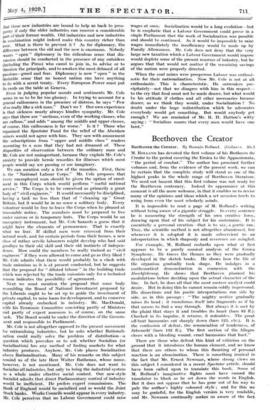Beethoven the Creator Beethoven the Creator. By Romain Rolland. (Gollanez.
30s.)
M. Rol-LAND has devoted the first volume of his Beethoven the Creator to the period covering the Eroica to the Appassionata, " the period of combat." The author has promised further volumes and, from the evidence of the present work, we can be certain that the complete study will stand as one of the highest peaks in the whole range of Beethoven literature. We need not lament that this first volume was not ready for the Beethoven centenary. Indeed its appearance at this _moment is all the more welcome, in that it enables us to revise .many of the opinions and ideas which a set occasion tends to wring from even the most scholarly minds.
It is impossible to read a page of M. Rolland's writing without being aware of a gigantic struggle. In every sentence he is measuring the strength of his own creative force, drawing upon that of his subject for his sustenance. It is essentially a personal creation—that is to say, a poetic One. True, the scientific method is not altogether abandoned, but whenever it is adopted it is made subservient to an interpretation in which rhapsody and reverence are mingled.
For example, M. Rolland embarks upon what at first appears to be a purely musical analysis of the Eroica Symphony. He traces the themes as they were gradually developed in the sketch books. He shows haw the life of the organism gradually took shape. He indulges in a mathematical demonstration in connexion with the Dnrchfiihrung. He shows that Beethoven planned his modulations before deciding upon the actual character of the line. In fact, he does all that the most austere analyst could desire. But in doing this he cannot remain coldly impersonal. His dissections and his poetic interpretations run side by side, as- in this passage : " The mighty motive gradually raises its head ; it transforms itself into fragments as if by that means to find a way through. But always it is met by the plaint that stays it and troubles its heart (bars 83 if.). Checked in its impulse, it returns, it redoubles. The great off-beat harmonies cut sharply down (bars 123, etc.). It is the confession of defeat, the renunciation of tenderness, of Sehnsucht. (bars 132 ff.). The first section' of the Allegro closes with a bleeding wound, cruel harmonies that hurt."
There are those who defend this kind of criticism on the ground that it introduces the human element, and we know that there are others to whom this flaunting of personal reaction is an abomination. There is something ironical in the fact that Mr. Ernest Newman, whose strong views on this subject I considered in a recent Spectator article. should have been called upon to translate this book. Some of M. Rolland's imaginative flights must have caused the translator to blush as he set down the words in English. But it does not appear that he has gone out of his way to pale the author's highly coloured style ; and for this we may be grateful, for the English version is very readable, and Mr. Newman continually makes us aware of the fact that in the French language*. these transports . ring, more truly; -.M. Rolland pours - scorn Upon: biographers -whiti set out to read their he a lesson, and he does not hide-,the fact that it is Thayer whom he haii in mind. 'Certainly-he *himself is guilty of no such insolence.- purpose is, rather, to derive some spiritual significance from -the smallest of -Beethoven's actions and from the alightest incidents in -his -life,: but the -motive is always so sincere and the attitude so :genuinely humble that one is willing to condone some of the exaggerated figures of . 'speech; especially when one meets with such a passage as this : ." Beethoven would:, not.- be :Beethoven if he were not too much of whatever he was.- I .do not praise, him.;, I do not blame :him*: I am trying to .paint him whole. Whoever would, understand him must be :able to' ernbrace the excess of his contiasts, that brings about
his mighty equilibrium." -
, There are important , appendices. One deals exhaustively ,With the eyidence:coneerning Beethoven's deafness, with the author's own conclusion' that the trouble was accentuated by Beethoven's tremendous power of concentration ; and in this he seems to be supported by Dr. Marage, who agrees that there is a parallel between Beethoven's case and the practice of Yoga.
Another appendix- is devoted -to_ the Brunsvik sisters and Giulietta Guicciardi. During the centenary year M. de .11evesylpublished the results of his study of the files of the Ministry of Police at Vienna and the papers of Countess 'Therese -Brunsvik, which were discovered in the archives of -Palfalva. M. Rolland considers all the available evidence and presents a plausible picture of Beethoven in the company of 'these young women, who, one after the other, occupied the chief place in his . heart. Incidentally, attention, is dravin. to an error in 'M. de lieveSy's Beethoven, an error which should teach us id bewary of personal interpretations." * 7 "{ASH. MAINE.
,*" Beethoven, les grandee 40g:see creatriees." Editions du Sablier, Paris.























































 Previous page
Previous page